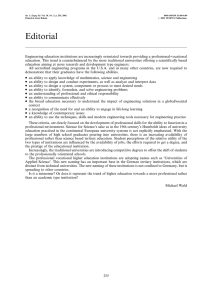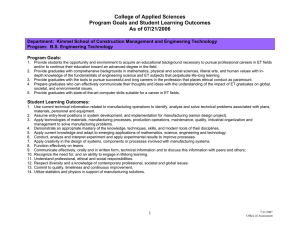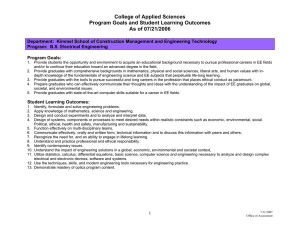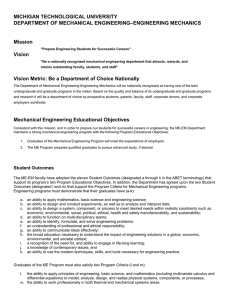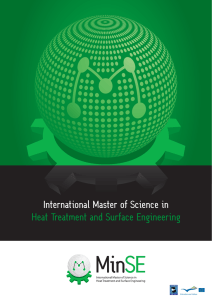Graduation Ceremony 23 Graduand’s Speech
advertisement
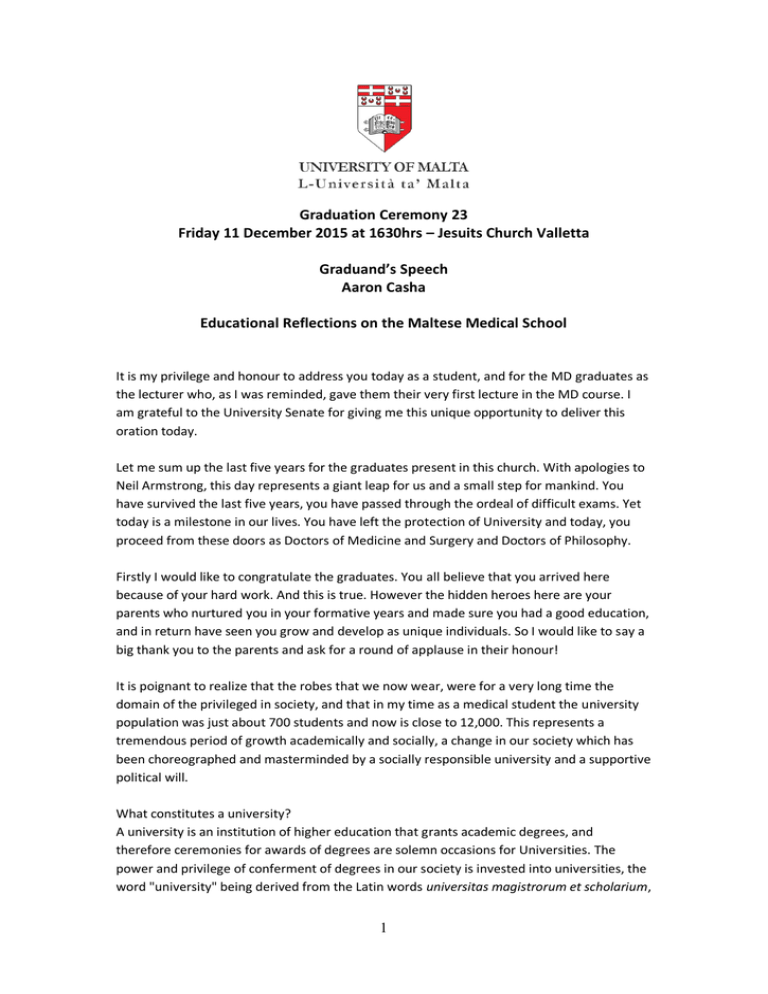
Graduation Ceremony 23 Friday 11 December 2015 at 1630hrs – Jesuits Church Valletta Graduand’s Speech Aaron Casha Educational Reflections on the Maltese Medical School It is my privilege and honour to address you today as a student, and for the MD graduates as the lecturer who, as I was reminded, gave them their very first lecture in the MD course. I am grateful to the University Senate for giving me this unique opportunity to deliver this oration today. Let me sum up the last five years for the graduates present in this church. With apologies to Neil Armstrong, this day represents a giant leap for us and a small step for mankind. You have survived the last five years, you have passed through the ordeal of difficult exams. Yet today is a milestone in our lives. You have left the protection of University and today, you proceed from these doors as Doctors of Medicine and Surgery and Doctors of Philosophy. Firstly I would like to congratulate the graduates. You all believe that you arrived here because of your hard work. And this is true. However the hidden heroes here are your parents who nurtured you in your formative years and made sure you had a good education, and in return have seen you grow and develop as unique individuals. So I would like to say a big thank you to the parents and ask for a round of applause in their honour! It is poignant to realize that the robes that we now wear, were for a very long time the domain of the privileged in society, and that in my time as a medical student the university population was just about 700 students and now is close to 12,000. This represents a tremendous period of growth academically and socially, a change in our society which has been choreographed and masterminded by a socially responsible university and a supportive political will. What constitutes a university? A university is an institution of higher education that grants academic degrees, and therefore ceremonies for awards of degrees are solemn occasions for Universities. The power and privilege of conferment of degrees in our society is invested into universities, the word "university" being derived from the Latin words universitas magistrorum et scholarium, 1 meaning "community of teachers and scholars.” The Oxford English dictionary defines the word ‘university’ as ‘a body of teachers and students engaged in giving and receiving instruction in the higher branches of study’. Note the use of the word ‘body’ as a ‘community of learning’, and the emphasis on ‘giving and receiving instruction’ as a two-way process, a journey together of learning, lecturers and students together. The ceremony of the degree award is an important event of great joy for the university community. It bears witness to this community’s commitment to greater understanding and knowledge, and follows a long tradition starting from the early guilds, monasteries and cathedral schools that has developed into the modern university. Lord Lionel Robbins in 1963 stated that the four objectives of a university education were: “1. instruction in skills; 2. the promotion of the general powers of the mind so as to produce not mere specialists but rather cultivated men and women; 3. to maintain research in balance with teaching, since teaching should not be separated from the advancement of learning and the search for truth; and 4. to transmit a common culture and common standards of citizenship”. The underlying principle tying the concept of community good is that university places "should be available to all … qualified for them by ability and attainment" Another key principle with a university heritage is that of ‘academic freedom’. This is the freedom of inquiry by faculty scholars, with the freedom to teach or communicate ideas or facts without harassment or loss of job security. This principle arose from the University of Bologna, the founding mater of all universities, in the 11th century. Their academic charter in the 12th century, called the Constitutio Habita guaranteed the right of a scholar to unhindered passage in the interests of education. This principle was reinforced in the Magna Charta Universitatum, a document marking the 900th anniversary of University of Bologna's foundation and signed in Bologna in 1988 by some 800 universities, including our University. The principle of academic freedom permits independent initiatives, and thus increases the effectiveness of research without the requirement of central direction, but still facilitates and fosters a spirit of cooperation, collaboration and partnership between researchers across faculties and indeed between universities. The freedom to pursue science for its own sake is essential for the advancement of science. The Bologna document, Magna Charta Universitatum also clearly highlights the importance of research. I quote: ‘Teaching and research in universities must be inseparable if their tuition is not to lag behind changing needs, the demands of society, and advances in scientific knowledge”. Therefore a key role of any modern university is to maintain and augment its research capability. This research capability, however, does carry its own responsibilities. In our case, our university is responsible for educating the majority of the graduates in this country. May I stress that it is the quality of teaching from this institution that permits academic excellence 2 in its graduates. In addition teaching and research ideally should be feeding on and informing each other. High quality teaching is of critical importance as it is well known that a good education is the cornerstone of a good career. The responsibility of the university in the field of research is more poignant in Malta, because our university remains the flag bearer in research and development and there is a special obligation to use funding wisely “to sustain economic growth of the country”, as the Rector Prof Juanito Camilleri has said. Universities are ranked primarily, if not exclusively, on the basis of their research output. The university’s track record in publications speaks for itself, with the number of papers with the authors’ address being Malta rising from approximately 97 papers between 1981 and 1985; then in five-year groups, 129, rising to 278, then 438, 546 between 2001 and 2005, 1161 in the 5 years ending 2010, and 2439 in the last 5 years (or almost 5 years). This large increase shows a continuing commitment to development by the academic staff who do not just concentrate on teaching, as in the past, but have grasped opportunities for collaboration and exploitation of resources, pursuing high quality research in an ethical context in a manner that distinguishes our University’s tradition, with the Faculty of Medicine excelling here, having about a third of the students receiving their Ph.D. this year from the University. I have been asked what drove me to read for a PhD? The answer is simple. Research can be very rewarding, fulfilling and mentally stimulating. A new discovery is an extremely uplifting event for a researcher, making one feel on top of the world. It is this that led me towards a PhD. I would like to point out that research often takes a course that is unpredictable at the onset. Let me illustrate this with my own experience. As a cardio-thoracic surgeon, I was vexed by dehiscence or failure of median sternotomy closures. I planned to do computer modelling of the sternum bone, but realised that the real problem lay in the quantification of chest wall forces. This led to the development of a computer model of the rib cage, which was later adapted to the lung and proved for the first time that primary spontaneous pneumothorax had a biomechanical origin. This model was then extended to tuberculosis and showed, for the first time that the reactivation of tuberculosis, also known as secondary tuberculosis was affected by chest wall shape. It dawned onto me that hollow organs were in fact physiological pressure vessels. These organs followed specific rules that applied to 3 physical pressure vessels (for example their mass is proportional to their contents). This concept was developed further and it emerged that the whole body followed the same rules and behaved as a pressure vessel. In effect I found that we are all walking pressure vessels. I could never have guessed where this journey was leading me. In retrospect I would like to point out that this was a journey of discovery and evolution in thinking – a voyage of contemplation, rumination and cogitation. It became clear to me that to fully account for the behaviour of biological materials and architectures, I often had to rely on mathematics to provide a detailed and expandable description. But isn’t mathematics an odd science, difficult to pin down its nature and yet the basis of the pursuit of every scientific endeavour? It is uncanny how a few mathematical symbols arranged in the form of an equation can model the world and unlock great truths. But does mathematics really exist? Is it a part of the fabric of our world waiting to be discovered (after all mathematics explains our world very well, from atoms to stars) or is it just an imagination of the human mind? As the mathematician Roger Penrose stated, does the human mind develop mathematical ideas or does the physical world actually obey mathematical laws? As John D. Barrow wrote, “All our surest statements about the nature of the world are mathematical statements, yet we do not know what mathematics ‘is’... and so we find that we have adapted a religion strikingly similar to many traditional faiths. Change ‘mathematics’ to ‘God’ and little else might seem to change.” In Malta, the foundation of the Collegium Melitense in 1592 by the Knights was the start of scientific teaching, including mathematics. In fact, under Grandmaster Lascaris, the class of Mathematics was funded from the proceeds of a croquet-like game, called il maglio, played by the knights in the Mall in Floriana. In our university, the Faculty of Medicine and Surgery is on the eve of its 340th anniversary of its foundation by Grand Master Nicolo Cotoner in 1676 as a School of Anatomy and Surgery. Since traditionally medical schools have developed around hospitals, it complemented the Sacra Infermeria that had been built almost a century before. The Sacra Infermeria enjoyed great prestige in its time, a sign of the success of the tutorage there. For example, Michel’angelo Grima, Chief Surgeon at the Sacra Infermeria and holder of the Chair of Anatomy and Surgery (and the subject of an exhibition hosted by our Faculty in 2008), was skillful at trauma surgery, and instructed his students by firing live rounds into corpses before letting his students practice bullet extraction. Grima was considered to be one of the best surgeons of his time, being adept at cutting for bladder stones, with operations lasting just two and a half minutes. He published three books and medical students from all over Europe travelled to Malta to learn as his apprentices, a sign of his excellence and the high standard of teaching at the medical school. Our university does trace its origins even further back. Pope Clement VIII on the 12th November 1592 authorised the building of a Collegium Melitense in Valletta, which became the Jesuit College. This makes our University, one of the oldest in Europe and the oldest in the Commonwealth outside the United Kingdom. There is no doubt that the Faculty of 4 Medicine and Surgery at the University of Malta enjoys high standing within the medical community globally, with some world-renowned doctors being graduates of this University. However a university cannot rest on past wreaths and laurels, however grand these achievements. The challenges of today stem from different directions. In particular education is now delivered from new areas, namely non-university education, by which I refer to the proliferation of profit-generating courses by commercial entities, and commercial universities such as private medical schools. These medical schools charge steep entrance fees and should be cash cows for their mother universities. In contrast, Malta’s Education Act of 1988, obliges the University to provide free tertiary education to applicants with sufficient entry qualifications including EU residents. The sharing of undergraduate clinical teaching resources at Mater Dei Hospital will provide a new challenge to our Medical School, but which may yet develop into novel opportunities. We must strive to maintain the pride in our University as a matter of national interest; we must also endeavour to continue the process of improving our University. Whilst we say that Medicine is a Science and an Art, it is obvious that technological achievements, better investigations and imaging techniques, and more widespread application of clinical governance and evidence based medicine and practice with clinicians accountable for excellence in clinical standards, has resulted in Medicine becoming more of a Science and less of an Art. There has been a tendency for a monetary value to be attached to life, with the advent of budgets and capping of resources increasingly dictating which treatments are affordable and which should be offered to select classes of patients. The calculation for a monetary value for a life saved is often placed at USD 100,000 [Peter Abelson] in America. This is really the cost of preventing death and its cost varies in different countries. You will increasingly be pressed to arbitrate such decisions. But remember your values embedded in patient-oriented care, defined by the Institute of Medicine as: "Providing care that is respectful of and responsive to individual patient preferences, needs, and values, and ensuring that patient values guide all clinical decisions." As Albert Einstein said “Try not to become a man of success. Rather become a man of value”. Acknowledgements Before concluding, I would like to thank my wife, family and parents for the support during these last years. I am very grateful for the supervision, guidance, help and support offered by Prof Marie-Therese Camilleri-Podesta’ , my supervisor, and Prof Joseph N Grima, my cosupervisor. I would also like to thank the members of the Metamaterials Unit, in particular Dr Ruben Gatt and Dr Daphne Attard for the collaboration, an engaging academic environment and their critical yet supportive feedback. Conclusion Nelson Mandela said “Education is the most powerful weapon which you can use to change the world.” Many would say that it is impossible or foolhardy to change the world. Let me share a secret with you – I believe the graduates in this church are ready to change the world. 5 Let us give them the means, the chance and the opportunity to change this world. Let us trust our graduates to change the world. By believing, you can imagine the unimaginable. By not believing, you cannot imagine the imaginable. I exhort you to go on to do great things; never lose touch with one another; make the most of it; this is where both the challenge and enjoyment of our profession begins! Thank you 6
